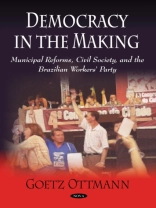Brazilian democracy is in dire straits. This, at least, is the opinion of many observers focusing on Brazil’s re-democratisation process. Whereas the emotionally charged transition period culminating in the re-installation of a civilian government in 1985 stirred the hopes of many observers that a renewed civil society would be able to lead Brazil into an era liberal democracy (Sader 1988; Alvarez 1997; Abers 2000; Dagnino 2002), these hopes were soon disappointed. Recent contributions to the field talk about the survival of ‘traditional’ political elements that weaken Brazil’s democracy and argue that populism, personalism, patronage, and clientelism remain common features in post-authoritarian Brazil (O’Donnell 1988; Mainwaring 1990; Roniger 1990; Mettenheim von 1995; Hagopian 1996; Weyland 1996; Power 1997; Gay 1998; Banck 1998a; Conniff 1999; Mainwaring 1999; Kingstone and Power 2000; Power 2000; Weyland 2000). Moreover, similar ‘traditional’ political practices have been detected within the new civic infrastructure that has been constructed since the return to democracy in 1985 (Baierle 2002; Chaves Teixera 2002; Dagnino 2002; Tatagiba 2002; Torres Ribeiro and Grazia 2003; Ottmann 2004). And, more recently still, many observers have been shocked that even Brazil’s socialist Workers’ Party (PT), celebrated by some as one of the last bastions of democratic socialism in Latin America, draws on patronage and elements of clientalism to strengthen its electoral support (Petras 2004; Avelar 2005). Whatever happened to the effervescent civil society that during the 1980s seemed to carry Brazilian politics into a more democratic era (Weffort 1984; Sader 1988)? Perplexed by this mysterious disappearance of pro-democracy forces, this book examines the democratisation process in three Brazilian municipalities – Itabuna (BA), Sao Paulo (SP), and Porto Alegre (RS) – administered by Brazil’s reformist Workers’ Party, the PT (Partido dos Trabalhadores). The book maintains that the main protagonists of Brazil’s democratic consolidation are the pro-democracy movements within civil society or, in short, the civic movements, most of which have roots in the protest movements against the military regime during the 1970s and 1980s.
Goetz Ottmann
Democracy in the Making [PDF ebook]
Municipal Reforms, Civil Society, and the Brazilian Workers’ Party
Democracy in the Making [PDF ebook]
Municipal Reforms, Civil Society, and the Brazilian Workers’ Party
Beli ebook ini dan dapatkan 1 lagi PERCUMA!
Format PDF ● Halaman-halaman 168 ● ISBN 9781617283581 ● Penyunting Goetz Ottmann ● Penerbit Nova Science Publishers ● Diterbitkan 2018 ● Muat turun 3 kali ● Mata wang EUR ● ID 7219740 ● Salin perlindungan Adobe DRM
Memerlukan pembaca ebook yang mampu DRM












